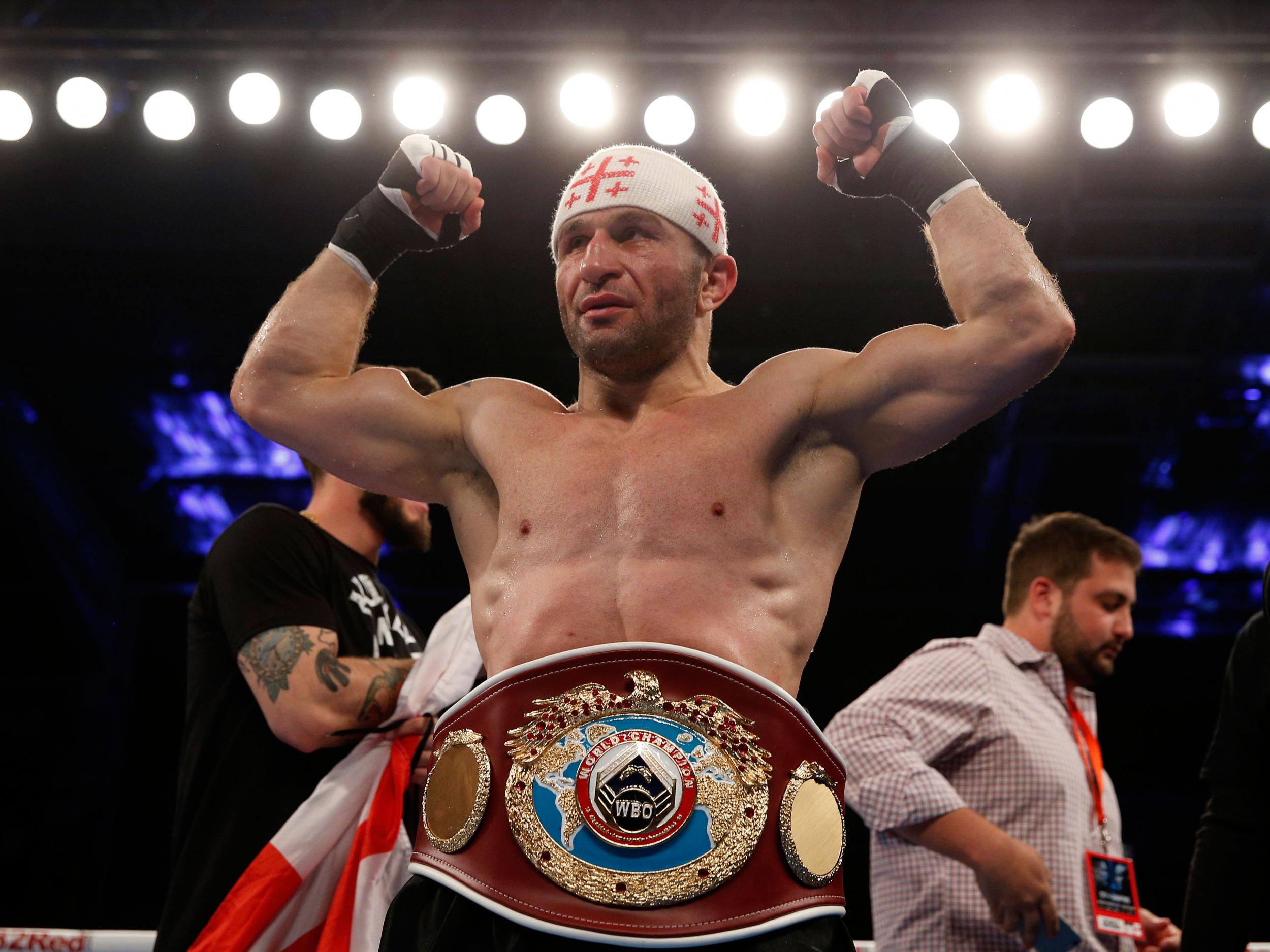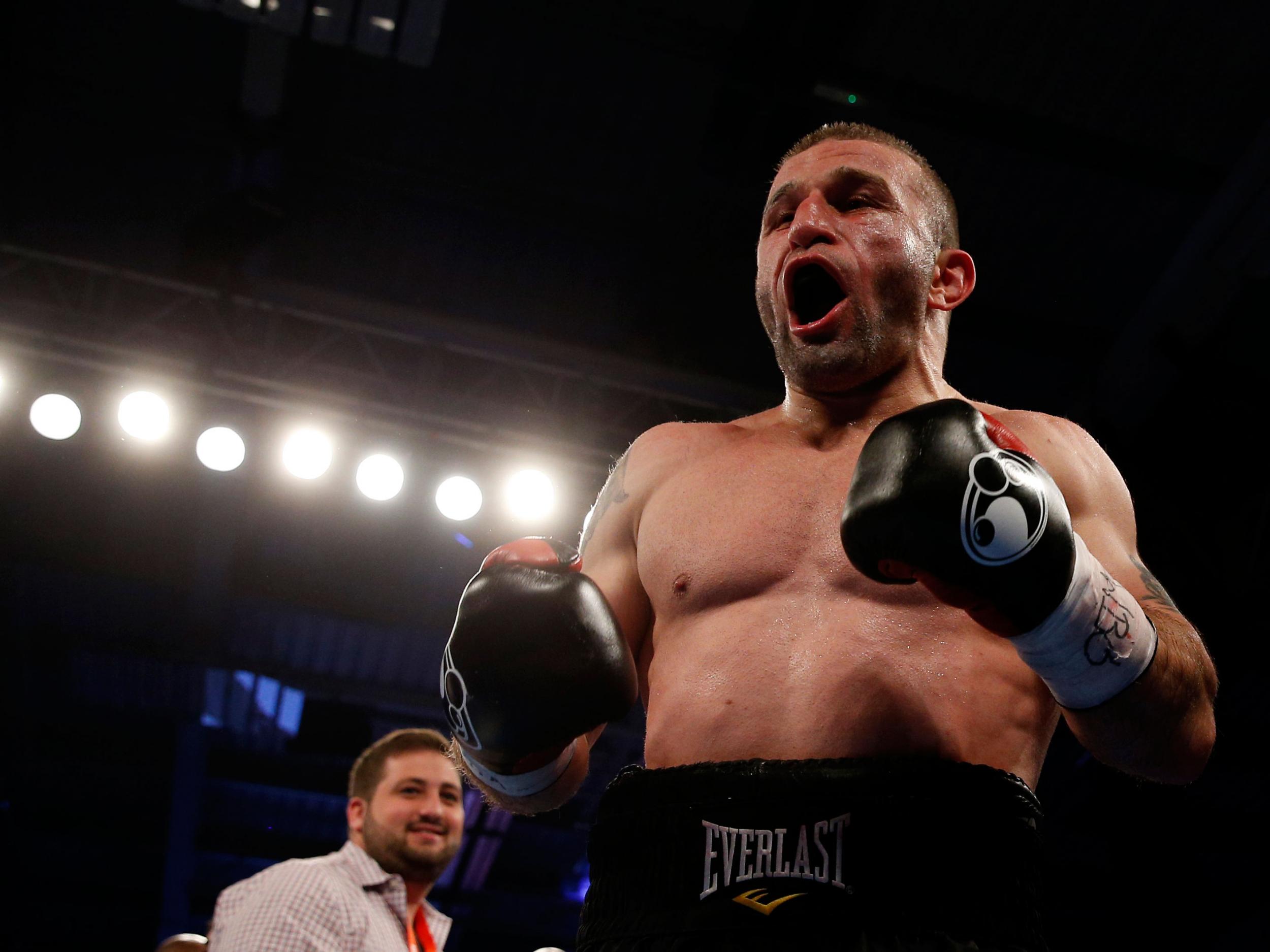Former world boxing champion Avtandil Khurtsidze jailed for his 'chief enforcer' role in major crime syndicate
Avtandil Khurtsidze won an interim world boxing championship in April 2017. Now he has been jailed for being the chief enforcer of a crime syndicate accused of involvement in everything from murder-for-hire to stealing chocolate

Your support helps us to tell the story
From reproductive rights to climate change to Big Tech, The Independent is on the ground when the story is developing. Whether it's investigating the financials of Elon Musk's pro-Trump PAC or producing our latest documentary, 'The A Word', which shines a light on the American women fighting for reproductive rights, we know how important it is to parse out the facts from the messaging.
At such a critical moment in US history, we need reporters on the ground. Your donation allows us to keep sending journalists to speak to both sides of the story.
The Independent is trusted by Americans across the entire political spectrum. And unlike many other quality news outlets, we choose not to lock Americans out of our reporting and analysis with paywalls. We believe quality journalism should be available to everyone, paid for by those who can afford it.
Your support makes all the difference.Even by the dubious standards of prize fight history, it is a spectacular fall from grace.
Former world boxing champion Avtandil Khurtsidze has been sentenced to 10 years in jail after a US court convicted him of racketeering and wire fraud for his role as “chief enforcer” for a sprawling crime syndicate of ex-communist bloc nationals.
It now seems that not content with winning an interim WBO middleweight title in 2017, Khurtsidze was heavily involved in an organisation accused of a “dizzying array of criminal schemes”, from the terrifying – murder-for-hire – to the faintly ridiculous – stealing four tonnes of chocolate.
He was caught on film delivering beatings for Razhden Shulaya, a Georgian once described as “the Warren Buffet of crime”, and also participated in a plot to crack the algorithms of casino slot machines that involved kidnapping a software engineer to get him to divulge tech secrets.
Yet in his public career, Khurtsidze had an admirable record of 33 victories, including the knock-out of British boxer Tommy Langford, in Leicester, that secured him a temporary WBO middleweight title in April 2017.
With an attack style that saw him compared to a pit-bull, the 39-year-old was known as the “Mini-Mike Tyson”.
Thanks to his sentencing on Friday, he now shares another characteristic with Iron Mike: a prison record.
There are, however, some differences.
In 1992, when Tyson was convicted of raping an 18-year-old beauty queen, former fight sponsor Donald Trump issued a public call for him to be spared jail, claiming: “A lot more good can be done by having Mike Tyson pay a substantial award to the victim … and creating [an] award for people that were abused or raped in the state of Indiana."
In this case, however, it seems extremely unlikely that the now President Donald Trump will demand clemency for the USSR-born mini-Mike Tyson.
Khurtsidze was arrested in early June 2017, a month before he was due to fight Briton Billy Joe Saunders for the WBO middleweight title.
He was one of 33 suspects detained in a swoop against what law enforcement called “the Shulaya Enterprise”.
It was, said Joon H. Kim, acting US Attorney for Manhattan, “a Russian [and Georgian] organised crime syndicate allegedly engaging in [a] dizzying array of criminal schemes [including] a murder-for-hire conspiracy, the theft of cargo shipments containing over 10,000 pounds of chocolate, and a fraud on casino slot machines using electronic hacking devices.”
The US Justice Department claimed the “coast-to-coast network” was also involved in extorting local businesses and bribing law enforcement, running a brothel in Brooklyn, and “use of a female member to seduce men, incapacitate them with chloroform, and then rob or blackmail them.”
It was, said Manhattan US Attorney Geoffrey S. Berman, “a criminal enterprise engaged in schemes that could easily be mistaken for a Hollywood thriller.”
At its heart, it was claimed, was Razhden Shulaya, 41, born in the former Soviet republic of Georgia but based in Brighton Beach, an area of Brooklyn sometimes called “Little Odessa” because of its communities of Russian and east European emigres.
Shulaya has claimed he is just the humble manager of a tow truck leasing company. His supporters claim he is the victim of discrimination resulting from the current tense relations between the West and Russia.
Those who successfully secured his June conviction for racketeering, however, painted a very different picture.
Shulaya, they said was a “vor”, a “thief-in-law”, roughly the Soviet equivalent of a godfather.
He was, it was claimed, fond of the oblique but unmistakeable threat, “bullets will find them”. He was apt to boast, “Vors do not sleep”.
The writer Garret M. Graff described how in return for his protection, criminal subordinates paid Shulaya obshchak, (“tribute”), ranging from cash and vodka to a top of the range crossbow and a Mercedes.
The price of protection for one brothel, Graff wrote, was Shulaya allegedly being able to make free use of it.
And if anyone failed to offer enough obshchak, if they disrespected the vor or failed to pay him, they could expect to face Khurtsidze.
By hacking the iPhone app that controlled the surveillance cameras at Shulaya’s illicit gambling den in Brooklyn, the FBI obtained footage of Khurtsidze delivering a punch to the face of a man accused of owing money to what prosecutors called “the poker house”.
A further slap to the man’s face seems to have convinced him to pay up rather than face further punishment.
Things did not always go so smoothly, however. On another occasion, an FBI informant saw the boxer and others escort an associate into a back office at the poker house. The victim emerged bloodied, but when Shulaya ordered ice for the man’s face, none could be found.
The vor rounded on Khurtsidze.
“Why did you hit him so hard?” he demanded.

Brooklyn-based Khurtsidze, however, seems to have provided more than just muscle for the Shulaya Enterprise.
Prosecutors convinced the New York court jury that Shulaya and Khurtsidze “jointly participated in a scheme to defraud casinos by targeting particular models of electronic slot machines using a complicated algorithm designed to predict the behaviour of those machines.”
“Shulaya,” the Justice Department said, “obtained the technology used to commit that fraud through violence, including through the 2014 kidnapping of a software engineer in Las Vegas.
“Shulaya and Khurtsidze then refined that technology by training lower-level members to execute this casino scam using smartphones and software developed by the Enterprise.”
One news report quoted a prosecutor as saying “They turned slot machines into ATMs”.
Part of Khurtsidze’s defence was to claim that he did not work for Shulaya and merely knew him socially from the time they were both living in the Georgian city of Kutaisi.
This defence tactic was not, perhaps, entirely without risk. Shulaya’s criminal career is thought to have begun in Georgia when he was part of the criminal Kutaisi Clan.
In January 2013, at a time when Shulaya was still thought to be in Georgia, news reports claimed the Kutaisi Clan was involved in violent gang warfare over who would get valuable construction contracts for the 2014 Sochi Winter Olympics.
One alleged rival gang leader was gunned down in Moscow using a Soviet-era rifle.

And yet for all the alleged violence, it seems the Shulaya Enterprise and with it the boxer Khurtsidze were finally brought down by four tonnes of chocolate.
In March 2017, gang members including senior lieutenant Zurab Dzhanashvili posed as a legitimate shipping company to get hold of a trailer filled with 100,000lbs (4,535kg) of chocolate peanut butter cups that should have been distributed to New York retailers.
Instead the gang members set about selling the stolen chocolate themselves, a potentially lucrative crime, albeit one that rarely features in Hollywood thrillers.
Unfortunately for Dzhanashvili, who has now pleaded guilty to his role, they began negotiating with someone they thought was a buyer willing to receive stolen chocolate, but who was in fact an FBI informant.
This, it has been suggested, was the final piece in the jigsaw needed to bring down the Shulaya Enterprise.
About two months after the negotiations to sell chocolate, law enforcement swooped on Khurtsidze, Shulaya and 32 others.
A New York jury returned a unanimous guilty verdict on the boxer in June. He was sentenced on Friday. Shulaya is expected to be sentenced on September 21.
Khurtsidze may still have support in some quarters.
Graff reported that days before his conviction he wrote from prison claiming he was possibly the jail’s “happiest inmate” thanks to the “love and warmth” in messages from fans in the US and Eastern Europe.
But he no longer has his freedom. Nor does he have his title – that was taken away from him two weeks after his arrest.
Join our commenting forum
Join thought-provoking conversations, follow other Independent readers and see their replies
Comments